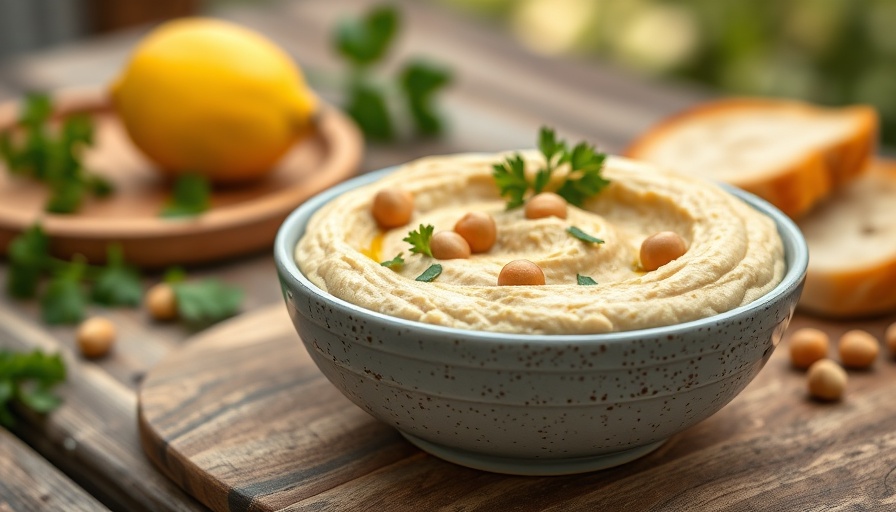
Discover the Secret to the Creamiest Hummus
Hummus has become a staple in many healthy eating regimens, particularly for those interested in a plant-based diet or the Mediterranean diet. After experimenting for over 20 years, the journey to the perfect hummus reveals not just a recipe but a fusion of health benefits and taste. Why is this simple dish capturing hearts and palates? It's creamy, nutrient-dense, and incredibly easy to make, making it the ultimate healthy snack.
The Health Benefits of Hummus
Hummus isn’t just a delightful dip; it's a powerhouse of nutrients! This creamy spread is primarily made from chickpeas, which are high in protein and fiber, aiding in digestion and promoting feelings of fullness—critical factors in weight loss nutrition. Moreover, chickpeas contain vitamins and minerals like iron and magnesium, essential for a balanced diet.
Additionally, the olive oil traditionally used in hummus is a source of healthy fats, particularly omega-3 fatty acids, known for their heart-healthy properties. By choosing quality, organic ingredients, you can enhance the nutrient density of your hummus, making it not only delicious but also a significant contributor to your health.
Clean Ingredients for Optimal Wellness
When preparing hummus, prioritize clean eating by selecting organic ingredients. This means choosing chickpeas that are free from preservatives and using natural tahini. Ensure your spices are fresh and free from additives. This commitment to whole foods elevates the flavors while ensuring you consume boosting foods that contribute to your overall wellness.
By following a simple recipe that highlights these clean ingredients, you're not just making food but promoting a healthy lifestyle. Hummus can be a platform for introducing a variety of superfoods—think adding roasted garlic for flavor and health benefits or even throwing in some spinach for an extra nutrient kick!
A Create-Your-Own Flavors Approach
One of the joys of making hummus is the ability to customize. You can easily adapt your basic recipe to incorporate seasonal produce or personal tastes. For instance, why not try a beet hummus for a vibrant color and an infusion of antioxidants? Or add roasted red peppers for flavor, engaging the palette while helping to meet goals like portion control and variety in your diet.
Experimenting with flavors can also lead to more nutritious dips. The possibilities are endless, from avocado hummus for an added touch of healthy fats to a spicy variant with chili peppers, giving your taste buds a delightful surprise.
Practical Tips for Meal Planning with Hummus
Making hummus in advance is an excellent aspect of meal prep. It can be stored in the fridge for up to a week, allowing for quick, healthy snacks throughout the week that support mindful eating. Pair it with sliced veggies, whole grain crackers, or spread it on your sandwich for added flavor and nutrients.
Moreover, incorporating hummus into your diet can be part of a broader approach to nutrition for energy, helping you maintain optimal levels throughout your busy day. It's manageable, portable, and undeniably satisfying.
Conclusion: Embrace the Hummus Revolution
Creating the moistest, creamiest hummus is about more than the recipe; it’s about fostering a mindset of health and well-being. Whether you are already a hummus lover or are just beginning your culinary journey, the rewards of making this dish are bountiful. You can boost your immunity, enjoy significant taste, and incorporate more whole grains and legumes into your meals—all vital steps to reaching your health goals. Start your hummus journey today: gather your ingredients, and unleash your creativity in the kitchen!
 Add Row
Add Row  Add
Add 




Write A Comment